Coffee in Turkey, a restaurant in Venice.
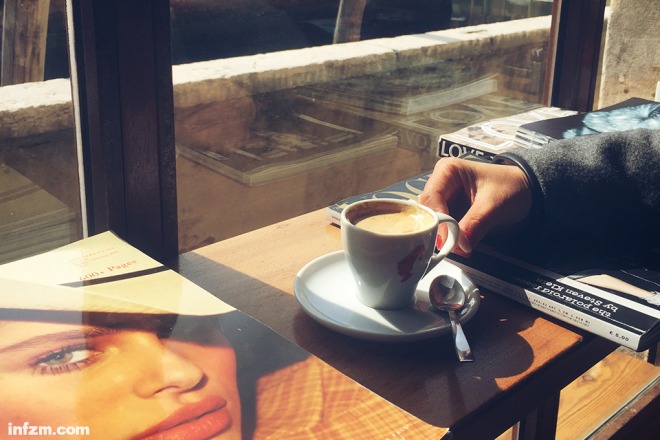
In the sunshine of Venice, coffee goes better with books and magazines than mobile phones. (Liu Jie / photo)
(this article was first published on "Southern weekend" on May 4, 2017)
For professional baristas, please follow the coffee workshop (Wechat official account cafe_style)
Why do you keep staring at your mobile phone with your navigation on, against the nature of the city? getting lost and surprise is the most memorable Venice. When there is no way out, when I am tired of walking, I just choose a small cafe to sit down and have a rest, look at the pigeons and eavesdrop on the local people.
As a tourist, I came to Venice for the first time. Venice, which has been described and praised countless times, this Venice, which is "where the joy of the celebration, the world's ecstasy", suddenly shows itself in front of me like this: as soon as I get out of the railway station, what comes unexpectedly is the open canals, churches, bridges, and the peculiar smell of Venice. Like countless tourists, I walked up and down the river, across one wide or narrow alley after another, all the way to St. Mark's Square, the most beautiful living room in Europe, as Napoleon called it.
"cast your weary eyes in the sun into the windowless gloom, drift in a boat, sit on a balcony with your legs hanging out, or drink coffee in a Florida Cafe. A day in Venice is so trivial. " What exquisite trivialities in Henry James's works.
You don't have to take the time to find it, in St. Mark's Square, you just need to follow the music to see the mottled walls of Florida. When I stepped into this cafe, I was deeply impressed by its elegance, luxury and heavy history, like Alice in Wonderland and mistakenly on the set of some old movie. So I am no exception, a cruel, take out more than ten euros to feel a condensed history of coffee. As we Chinese often say, "here we come."
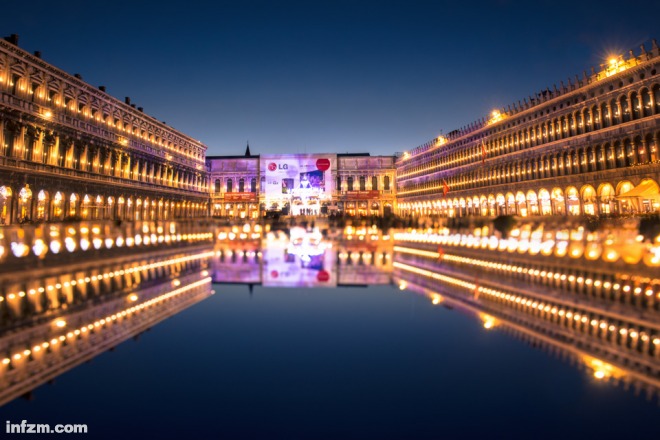
St. Mark's Square, Napoleon called the most beautiful living room in Europe. (Li Tianyu / photo)
One cup of coffee, one world.
However, after a long time in Venice, gradually integrated into the life of this labyrinth-why to turn on the navigation has been staring at the mobile phone, against the nature of the city, getting lost and surprise is the most memorable Venice. I began to wander around like the locals, wandering aimlessly through various winding alleys, sometimes meeting happy mixed-haired puppies, sometimes lonely and deep courtyards, and sometimes suddenly there was a river-there was no way. When I was tired of walking, I randomly picked a small cafe to sit down and have a rest, watching the pigeons and eavesdropping on the local people.
One day, I strolled near the Oriental College of the University of Venice, and I always met some delicious food next to the university, which is exactly the same as in China. There is an unknown cafe at the entrance of the alley. As usual, I asked for a cup of concentrate.
"well, your concentrate is over there." The barista quickly handed me the coffee and pointed to it as a typical Italian man with a beard.
"Thank you, but I don't need sugar. I like bitter coffee." I was a little hesitant about another baked almond jam cookie.
"are you Chinese?" A timid female voice next to me said, "you are the first Chinese I met who drank coffee without sugar."
So I started talking to Marta, an Italian girl who was learning Chinese, and asked her what coffee was to her.
"Coffee," she said seriously, "looks simple, but it's actually one of the most complicated things in the world. The first is to choose beans, each year the climate is different, the origin is different, the taste of beans is different, you have to carefully distinguish their taste, and then mix different beans to get the taste you want. Then there is fried beans, temperature, speed, are very critical, ah, I may be too professional. For example, in the coffee machine in front of us, every day the baristas have to adjust their techniques according to the weather, humidity and other factors, and the taste of the water is also very important. I have a friend in Naples who moved to Milan and complained that the coffee could no longer taste like the home. "
After talking a lot, she suddenly stopped, looked at me, and said in Chinese, "A cup of coffee, as you say, is philosophy, a flower and a world." A cup of coffee is a big world, a world with only one minute of life. " After a minute, the coffee died and tasted bad, which is why things like Starbucks are not accepted in Italy. Recall that Oscar Wilde once complained that cold coffee was as intolerable as warm champagne.
I am suddenly very happy, for the unexpected encounter of Eastern philosophy in a foreign country, for one flower, one world, one leaf and one Bodhi. Venice, this small lagoon city, from the city-state of the tenth century BC to the glorious Republic of Venice, from the Roman Empire to the Kingdom of Italy, carries a heavy history, but blossoms on the Adriatic Sea with a strange sense of lightness, as the terminus of the Silk Road, ushering in Eastern philosophy and coffee.
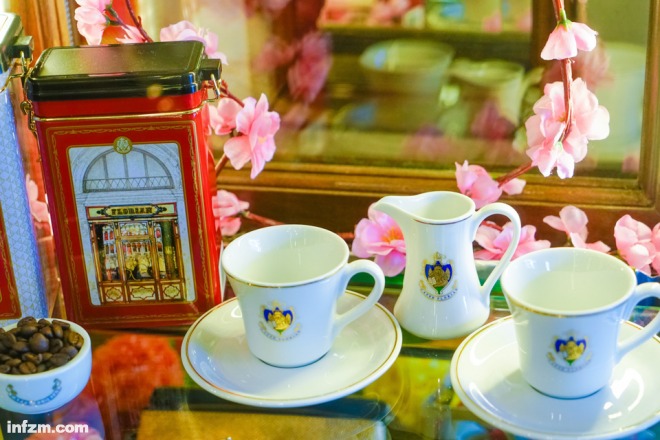
The Eastern philosophy of "one flower, one world" has become the western philosophy of "one cup of coffee, one world" when it comes to Europe. (Li Tianyu / photo)
Have coffee with you every morning for the rest of my life
Coffee, pizza and spaghetti are the delicacies that Italians are most proud of. In private, I always suspect that pizza is inexplicably related to Marco Polo's visit to China, but coffee is really not a popular Italian drink. "but it is carried forward in our hands and is famous in the world." So the Italians say.
There is no doubt that coffee is essential to Italian life-both at home and outside-it connects Italians in different ways, and each cup of coffee is intertwined with their daily emotions, big and small. it conveys subtle or intense emotions. And the cafe, like the small stage of the city, staged all kinds of stories from morning till night. Let's imagine that coffee, the world's second-largest transaction after oil, consumes about 10 jin per person in Italy every year, of which 70% is consumed in households, 20% in cafes and 10% in the workplace. These statistics may not be enough to tell us clearly the characteristics of Italian culture and living habits, but it has enabled us to quickly come up with a hundred stories-the Italian version of "four generations living together", "Teahouse", "Coffee Story of Zhiming and Chunjiao" and "Coffee Battle across the World".
In the Starbucks we are familiar with, the United States represented by it, and some Nordic countries, you can buy a large cup of coffee and drink it when you are busy, and you can ask your friends to stay in the cafe for a whole afternoon in your spare time. The situation is different in Italy, where coffee is only part of breakfast or only drunk during a break, and no one will go shopping slowly with coffee in hand-don't forget, Italian coffee is marked by a small cup of espresso, Espresso, which means "fast", make it quickly and drink it quickly. People go to the cafe, drink a cup of concentrate in one breath, and then start to chat intently, or leave. Most of those who work in the cafe with notebooks are foreigners.
I used to be an anachronistic foreigner who was secretly ridiculed. At three o'clock in the afternoon, when the barista asked me what I wanted, I would confidently buy a cappuccino and sit down alone. out of place among a group of foaming natives. Sometimes they would stop and wink at me, and at that time I was confused and didn't know what had happened. Attention, we foreigners, in Italy, no one will drink cappuccino after ten o'clock in the morning.
"and you, what can I get you, Massimo?"
"I just want to have the first cup of coffee with you in the morning, and that's enough for me. But it must be every morning for the rest of our lives. What do you think? "
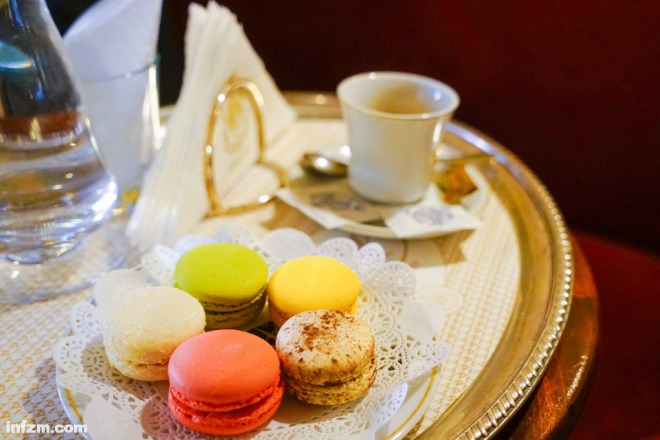
(Li Tianyu / photo)
Such sweet Italian love words don't happen to me, it's the novel I read recently. Closing the novel, I got up and went to the kitchen, lit the fire, made coffee, and began knocking on my roommate's door one by one: "Sophie, would you like some coffee?" Angela, coffee? Who wants coffee? " The girls poked their heads out one by one, and with the sound of boiling coffee, the whole family became lively, and for a moment there was some twilight and smoke, and the pots and bowls clanged into smoke and fire.
If you ask your Italian friend, what does coffee mean? Then it may take you a day to listen to the story.
"Coffee for me is a reward for hard work. I work hard for a while, and then it's coffee time. How wonderful it is to rest, coffee and chat with friends."
"Coffee, like your lover, is something that allows you to get up with a smile in the morning, especially on Monday morning, Mamma Mia, you know."
"Coffee, I think it's companionship. You know we Italians don't like to be alone. It feels particularly miserable. When you are alone, you can go to a cafe for coffee, meet friends, or meet new friends. "
"I drink three cups of coffee a day, one in the morning, one at noon and one in the evening. As a matter of fact, coffee is not refreshing to me, and I don't know why, but I have to drink it, otherwise I feel like something is missing. "
"what can I say? Do you know a song? I need you like water and coffee. It means that these are all necessary for life. " Sophie, a lively girl who loves singing, began to sing as she spoke.
The protagonist of the novel I read is Massimo, a single man in his thirties, with a small cafe in the heart of Rome, the eternal city. Every dawn, he would walk through the half-awake street, accompanied by the smell of freshly baked bread, to his cafe, where the first cup of coffee in the morning was waiting for him. The days were spent calmly in cappuccinos and espresso until one day a green-eyed foreign girl with freckles on her face opened the door. Is it like the Italian version of Casablanca? "there are so many cities in the world, and there are so many pubs in the city, that she walks into mine."
Like the protagonist of the novel, the author works in a typical community cafe on the outskirts of Rome, where people come and go not so much guests as neighbors, like in the 1980s, when everyone knew each other, pushed the door, asked for a cup of coffee, and then greeted him around, and began to exchange the latest gossip-the living community culture.
The first stop of coffee landing in Europe
There are different opinions on the origin of coffee, and it is difficult for scholars to reach a consensus. In terms of naming, coffee may have been born in Ethiopia, and its name comes from Kaff, a small town there. It is widely said that there was a shepherd in Kafa. When he was herding the sheep, he found that the sheep became very excited by eating a red fruit, so he distributed the fruit to others, which was later called coffee. Pellegrino Artusi, an Italian literary critic and gourmet, author of the Science of the Kitchen and the Art of good eating, believes that coffee was discovered by monks by accident, and that its exciting effect can be used to deal with drowsiness, the worst enemy of night prayer, so the monks try to roast the fruit and grind it into soaking water to make a drink for everyone.
In Abdar Qadi's the Book of Coffee, we can also read another Arab legend about the origin of coffee, about a sheik Omar, a chief who was expelled from Yemen by his people in the 13th century, wandered in the desert and was about to die of hunger. Red fruit was found on the branch. Because of its hardness and bitterness, Omar boiled it with water and drank it. He was refreshed and saved.
The birth of coffee can even be found in religious works. For example, in the biblical story, Abbigail's husband angered David, so she went to David to plead with a large number of gifts, in which the "baked particles" were considered by some French scholars to be coffee, while in the story of the Queen of Sheba, the "precious stone" she brought when she went to see King Solomon was also coffee. In some Old Testament documents, the archangel Gabriel came to Mohamed's dream with a coffee branch in hand, thus solving his narcolepsy.
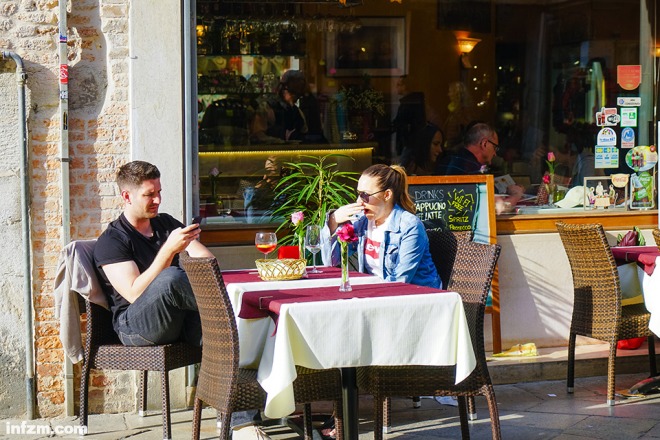
Coffee is still solving modern narcolepsy. (Li Tianyu/Photo)
If the legend is too old, we can go back to the sixteenth century and see how coffee conquered the West from the East, became the darling of the middle class, and took root in Italy. As early as the 15th and 16th centuries, coffee had not yet entered Europe, but it was noticed by doctors and scientists because of its antidepressant and digestive effects. For example, in 1592, Prospero Alpino, a doctor and botanist in Padua, Italy, brought back bags of coffee from the East and painted the first prints of coffee plants and fruit forms.
In the sixteenth century, coffee left its homeland and first arrived in the Ottoman Empire, beginning its journey to conquer Europe. Therefore, when it comes to coffee, many Europeans associate it with Turkey, just like when it comes to numbers, it comes to Arabs. Turks drank coffee from morning till night, whenever they wanted, for no reason or in any quantity, as often and as freely as they smoked. Men, women, children, at home, at work, at street stalls, people drinking coffee everywhere, if need be, after a cup, another cup.
Venice in the 17th century was an important link between East and West. A large number of rare treasures and spices from the East came and went to Venice Port continuously. In 1615, the year coffee, widely drunk in Asia Minor, was introduced to Europe by shrewd Venetian merchants from Istanbul, and Italy became the first stop for coffee as a commodity. Venetians became the first to learn how to taste coffee.
There are no flowers or gods in the Flower God Cafe
Coffee in the early days was a very expensive drink sold in pharmacies, a luxury only the rich could enjoy. In 1683, south of what is now St Mark's Square, the first coffee shops appeared, and one, two, three sprang up like mushrooms. In a short time, this exotic black bitter drink firmly attracted the attention of Venetians. By December 29, 1720, Floriano Francesconi also opened a cafe in San Marco Square, the Venetian Triumph Cafe, which was elegant and magnificent, and was obviously different from the previous Istanbul style coffee shop, so it was considered to be the first coffee shop in Italy, and witnessed the ups and downs of Italy for the next 300 years.
This Venetian favorite cafe is often mentioned. For convenience, people simply call it Floriano, the owner of the cafe. In Venetian dialect, it is called Florian Florian-equivalent to Li Xiaoming opening a cafe. Everyone calls it Xiaoming Cafe. In Chinese, it is called Flower God Cafe by many people. In fact, don't expect to find flowers or gods there. There is a statue of Flora near the Flower God Cafe in Paris.
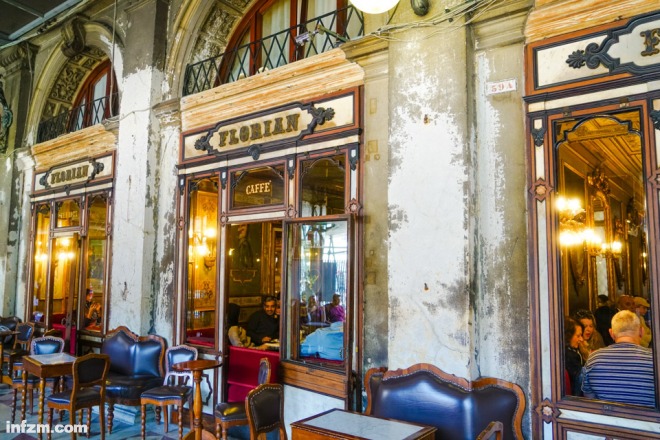
Florian Cafe has experienced ups and downs for three hundred years. (Li Tianyu / photo)
By 1763, Venice had 218 cafes, with a tray of coffee and chocolate as the best gift of friendship and love, while the Florian Cafe was the most fashionable place to drink coffee. There are all kinds of aristocrats and literati, from Carlo Oswaldo Gordoni, the father of modern drama, to Casanova, a legendary talent, from Goethe to Dickens, from Byron to Henry James, all of whom have talked loudly in the Florian Cafe, leaving their own footprints. In addition, Florian Cafe was one of the few cafes for women at the time, and you can imagine what a popular dating place it was and how many love stories were staged in it.
The Florian Cafe in the 19th century witnessed many important moments in Italian history. First, in the mid-18th century, the architect Cadorini renovated the cafe, expanding several rooms from two small rooms: the Hall of Fame, which includes the familiar Marco Polo and Titian; the Senate Hall, with scientific and artistic scenes depicted on the walls, "Progress and Civilization guiding the World"; the exotic China Hall and Oriental Hall full of the East; and the four Seasons Hall, decorated with portraits of ladies representing the four seasons.
Soon after, in the 19th century, in 1848, European countries broke out a series of largest armed revolutions in history, which indirectly led to the unification movement in Italy. The Florian Cafe has become a "conference room" for patriots, and talented people from all political factions have gathered in the Senate hall to express their views. It was also a "temporary hospital" that treated many patriots injured in the national revival movement. It can be said that it is inextricably linked with the history of Venice and even Italy. At the end of the 19th century, Venice Mayor Ricardo Sewati discussed with friends in the Senate hall of the Florian Cafe to launch the Venice Biennale, the world's art and architecture event, and held the first international art exhibition in 1895. As a result, Florian Cafe finally came to us from the dust of Italian history.
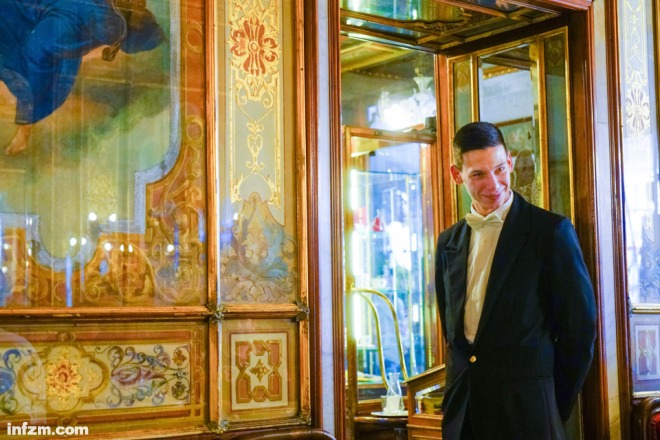
The elegance and splendor of Florian Cafe. (Li Tianyu / photo)
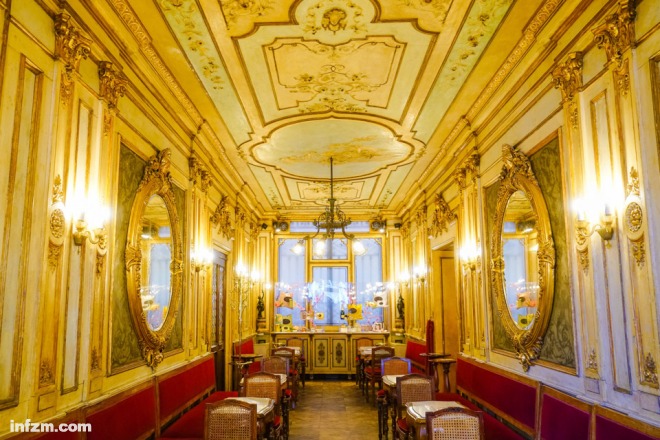
Interior decoration of Florian Cafe. (Li Tianyu / photo)
The Florian Cafe in the 20th century has undergone some changes, such as the addition of a small hall and the addition of a regular orchestra in the square. The sound of music, the sound of the sea breeze passing through the pillars, the singing of seagulls in the clouds, the mottled exterior walls, the guests talking and laughing on the red velvet sofa, and the reflection in the golden frame, as in the past few hundred years, decorate the water capital, the city of the bridge. In fact, Venice has never changed, and the Venetian love of coffee has never changed.
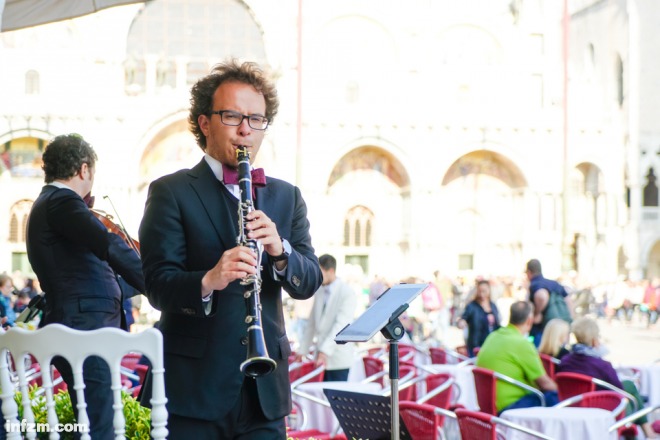
An orchestra performance added to the Florian Cafe. (Li Tianyu / photo)
Important Notice :
前街咖啡 FrontStreet Coffee has moved to new addredd:
FrontStreet Coffee Address: 315,Donghua East Road,GuangZhou
Tel:020 38364473
- Prev

Changhua Happy Love double STILL Shelter Cafe has opened!
Changhua Happy Love double STILL sheltered Cafe opened ceremoniously. (photo by Zhong Wuda) the Happy Love double STILL Shelter Cafe opened, and people with physical and mental disabilities learn to serve by selling coffee. Photo taken by Zhong Wuda. Changhua Happy Love double STILL sheltered Cafe opened, and caring people immediately supported the consumption. (photo by Zhong Wuda) Changhua County Happy Polio Care Association expands sheltered workshop training
- Next
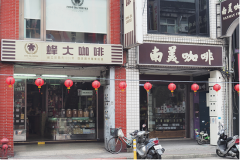
The difference between kindergarten and university? Taste the secret coffee of South America
The coffee boom in Taiwan is heating up, and small coffee shops in the streets are springing up like bamboo shoots after a spring rain. New-style coffee shops attract customers with baking beans and hand-brewing techniques. Although there are many excellent works, they are expensive, and as long as they become famous a little bit, they will be very popular. Therefore, I think that if you want to enjoy drinking coffee quietly and without burden, it is best to go to a coffee shop with a history. sixty
Related
- Can lightly roasted coffee beans be used to extract espresso? How finely should you grind high-quality coffee beans to make Italian latte?
- What is the difference between the world's top rose summer coffee and Yejia Shefi? What are the flavor characteristics of Yega Shefi coffee and Panama rose summer?
- The ceremony is full! Starbucks starts to cut the ribbon at a complimentary coffee station?!
- A whole Michelin meal?! Lucky launches the new "Small Butter Apple Crispy Latte"
- Three tips for adjusting espresso on rainy days! Quickly find the right water temperature, powder, and grinding ratio for espresso!
- How much hot water does it take to brew hanging ear coffee? How does it taste best? Can hot water from the water dispenser be used to make ear drip coffee?
- What grade does Jamaica Blue Mountain No. 1 coffee belong to and how to drink it better? What is the highest grade of Blue Mountain coffee for coffee aristocrats?
- What are the flavor characteristics of the world-famous coffee Blue Mountain No. 1 Golden Mantelin? What are the characteristics of deep-roasted bitter coffee?
- Can I make coffee a second time in an Italian hand-brewed mocha pot? Why can't coffee be brewed several times like tea leaves?
- Hand-brewed coffee flows with a knife and a tornado. How to brew it? What is the proportion of grinding water and water temperature divided into?

